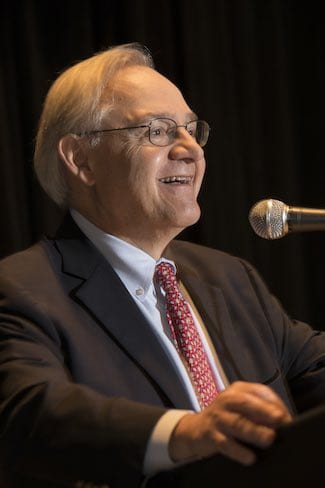Who is a member?
Our members are the local governments of Massachusetts and their elected and appointed leadership.

E.J. Dionne speaks to a crowd of local officials at the closing session of Annual Meeting
Washington Post columnist and political analyst E.J. Dionne issued a clarion call for the end of political divisiveness in America during the closing session of the MMA Annual Meeting in Boston on Jan. 20.
“We have to stop hating each other,” he said. “We have to remember that the first word in our Constitution is ‘we,’ and if we bury our sense of ‘we,’ we could well lose our democracy.”
In prepared remarks and an off-the-cuff question and answer session filled with jokes and Dionne’s encyclopedic knowledge of political history, the avowed progressive pleaded for more empathy in politics, patriotism instead of nationalism, and listening to the other side.
On that last point, the Fall River native pointed to the town meeting form of government prevalent in New England and the lessons it offers that should be applied to the national discourse.
Dionne discussed Jane Mansbridge’s 1980 book “Beyond Adversary Democracy,” in which she argues that Western democracies have gravitated to an “adversary” model, where people and elected officials vote to choose one option or another. Adversary democracy does not work toward consensus, but argues that the best shot at liberty and equal protection is a system built on a constant battle of interests that gives each side a chance at winning.
“Conflict, the argument goes, is freedom,” Dionne said.
Mansbridge promotes “unitary democracy,” exemplified by a town meeting, where face-to-face debate results in not just a majority decision but something closer to a consensus. It gives voice to those who otherwise might not be heard, can bring to light information that could otherwise be lost in political conversation, and makes citizens aware of their own interests and instills a sense of responsibility, self-respect and community.
“I think there is something so deeply valuable about an approach to democracy that assumes that even the person in town you have the most differences with might have something to contribute to a public conversation,” he said.
At a time when nationalism has been reinvigorated in the United States and across Europe, Dionne referenced author George Orwell, who said that while patriotism stands for devotion to a particular place and way of life, nationalism is inseparable from the desire for power.
He said American patriotism has been special historically, not only because the U.S. has proven to be exceptional when it comes to correcting its course, but because our nation is not based on loyalty to blood or soil. Instead, it is based upon the embrace of powerful propositions, beginning with “all men are created equal.”
American patriotism, he said, begins with pride – “our pride in our ability to absorb newcomers and the pride in their intense desire to become Americans.”
“We’re made up of many cultures,” he said, “but there’s a national culture we share and shape. … Generation after generation we create and recreate a uniquely American synthesis. The old and new interact and coexist. To borrow from our great national poet Walt Whitman, we contain multitudes.”
Dionne also made the case for more empathy in politics. He said empathy is not the same as sympathy or pity, and it does not only flow one way, from the elite to the less privileged. Empathy, he said, is a universal obligation to try to understand the situations others find themselves in and the complexity of their thoughts and feelings.
It’s easy to feel empathy for people whom we see as like ourselves, he said. The challenge is to feel empathy with those whom are different from us and with whom we disagree.
“I think that even if we have an obligation … to condemn forms of discontent that are expressed through racism, or anti-Semitism, or homophobia, or any other forms of prejudice,” he said, “we have an obligation to kind of look for the legitimate grievances underlying this, because we need to deal with the grievances if we’re ever going to overcome the prejudice.”
Summarizing one of the central obligations of democratic citizens, Dionne recalled historian James Kloppenberg’s channeling of Saint Paul.
“We need to learn to see through each other’s eyes, to think with one another’s minds, and to treat each other with charity. Boy, does our country need more of that now.”